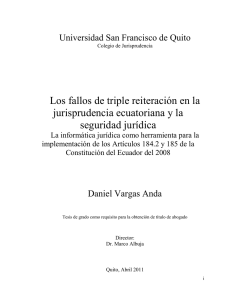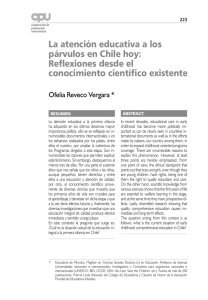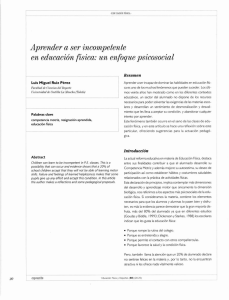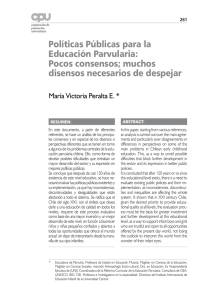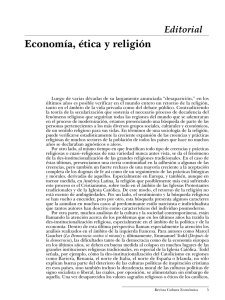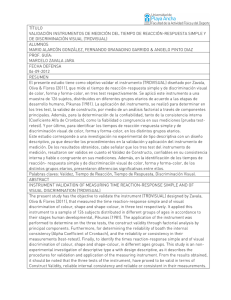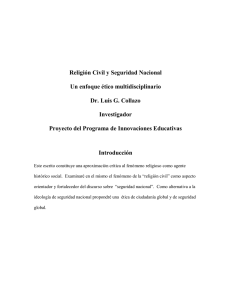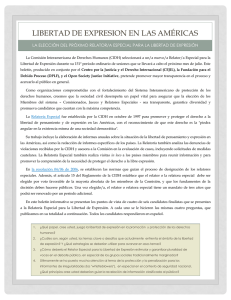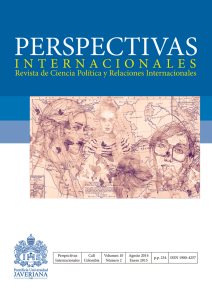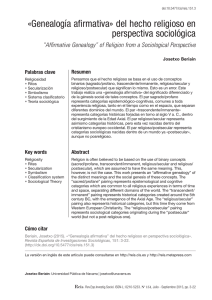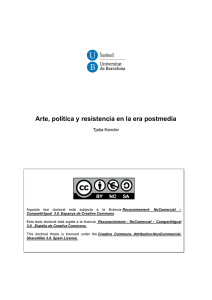han participat, una visió de conjunt de la problemàtica i els
Anuncio
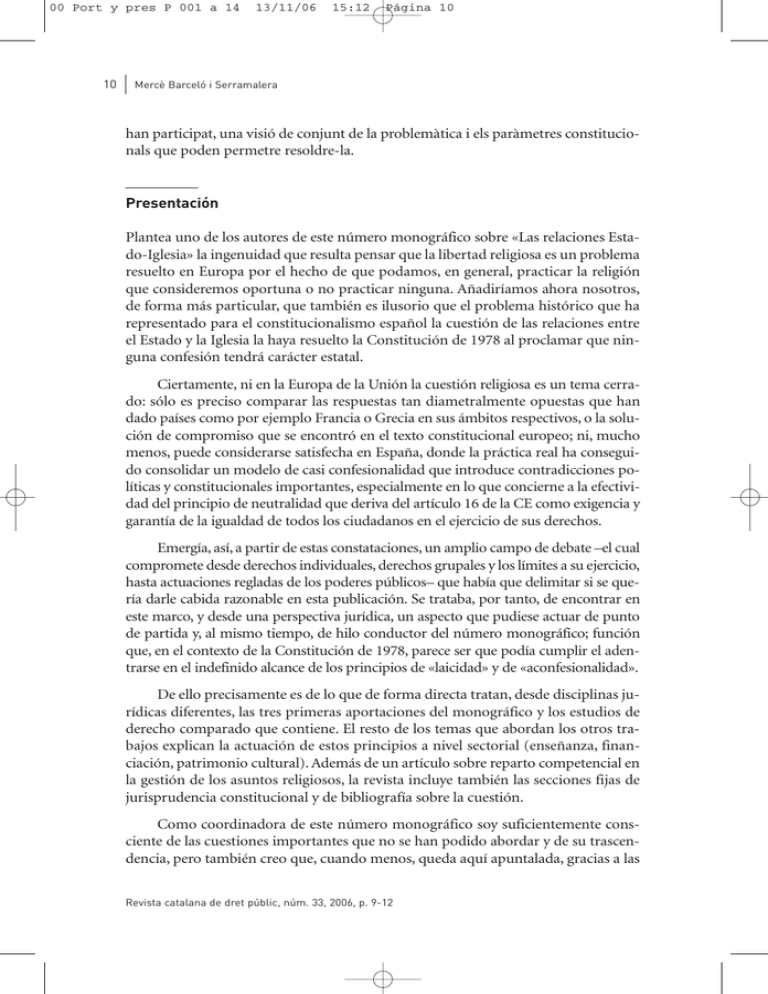
00 Port y pres P 001 a 14 10 13/11/06 15:12 Página 10 Mercè Barceló i Serramalera han participat, una visió de conjunt de la problemàtica i els paràmetres constitucionals que poden permetre resoldre-la. Presentación Plantea uno de los autores de este número monográfico sobre «Las relaciones Estado-Iglesia» la ingenuidad que resulta pensar que la libertad religiosa es un problema resuelto en Europa por el hecho de que podamos, en general, practicar la religión que consideremos oportuna o no practicar ninguna. Añadiríamos ahora nosotros, de forma más particular, que también es ilusorio que el problema histórico que ha representado para el constitucionalismo español la cuestión de las relaciones entre el Estado y la Iglesia la haya resuelto la Constitución de 1978 al proclamar que ninguna confesión tendrá carácter estatal. Ciertamente, ni en la Europa de la Unión la cuestión religiosa es un tema cerrado: sólo es preciso comparar las respuestas tan diametralmente opuestas que han dado países como por ejemplo Francia o Grecia en sus ámbitos respectivos, o la solución de compromiso que se encontró en el texto constitucional europeo; ni, mucho menos, puede considerarse satisfecha en España, donde la práctica real ha conseguido consolidar un modelo de casi confesionalidad que introduce contradicciones políticas y constitucionales importantes, especialmente en lo que concierne a la efectividad del principio de neutralidad que deriva del artículo 16 de la CE como exigencia y garantía de la igualdad de todos los ciudadanos en el ejercicio de sus derechos. Emergía, así, a partir de estas constataciones, un amplio campo de debate –el cual compromete desde derechos individuales, derechos grupales y los límites a su ejercicio, hasta actuaciones regladas de los poderes públicos– que había que delimitar si se quería darle cabida razonable en esta publicación. Se trataba, por tanto, de encontrar en este marco, y desde una perspectiva jurídica, un aspecto que pudiese actuar de punto de partida y, al mismo tiempo, de hilo conductor del número monográfico; función que, en el contexto de la Constitución de 1978, parece ser que podía cumplir el adentrarse en el indefinido alcance de los principios de «laicidad» y de «aconfesionalidad». De ello precisamente es de lo que de forma directa tratan, desde disciplinas jurídicas diferentes, las tres primeras aportaciones del monográfico y los estudios de derecho comparado que contiene. El resto de los temas que abordan los otros trabajos explican la actuación de estos principios a nivel sectorial (enseñanza, financiación, patrimonio cultural). Además de un artículo sobre reparto competencial en la gestión de los asuntos religiosos, la revista incluye también las secciones fijas de jurisprudencia constitucional y de bibliografía sobre la cuestión. Como coordinadora de este número monográfico soy suficientemente consciente de las cuestiones importantes que no se han podido abordar y de su trascendencia, pero también creo que, cuando menos, queda aquí apuntalada, gracias a las Revista catalana de dret públic, núm. 33, 2006, p. 9-12 00 Port y pres P 001 a 14 13/11/06 15:12 Página 11 Presentació autoras y autores que hay participado, una visión de conjunto de la problemática y los parámetros constitucionales que pueden permitir resolverla. Foreword One of the authors in this special edition on «State-Church relations» brings up how naïve it is to think that religious freedom is a problem that has been resolved in Europe, just because we can, in general, practice the religion we deem fitting, or not practice any. Now we would add, more particularly, that it is equally naïve to think that the historic problem of the question of the relations between the State and the Church for Spanish constitutionalism was resolved by the Constitution of 1978, when the latter proclaimed that no religion will be the state religion. Indeed, neither is the religious issue a closed subject in the Europe of the Union: we need simply compare the diametrically opposed responses given by countries such as France or Greece in their respective areas, or the compromise solution to be found in the European Constitution; and the issue is far from closed in Spain, where real practice has managed to consolidate a model of quasi-denominationality that entails major political and constitutional contradictions, particularly with regard to the effectiveness of the principle of neutrality derived from article 16 of the EC as a requirement for and guarantee of equality for all citizens in the exercise of their rights. The confirmation of all this gives rise to a broad field of debate – ranging from individual rights, collective rights and the limitations on the exercise thereof, through to the actions of the public powers – which had to be honed down to fit reasonably into the scope of this publication. The idea was therefore to find within this framework, and from a legal standpoint, an aspect that would act as a point of departure and at the same time as a leitmotif for this special edition; a function which, in the context of the Constitution of 1978, seems to be fulfilled if we delve into the indefinite scope of the principles of “laicity” and “adenominationality”. And this is precisely what the three first contributions and the comparative law studies of this special edition address directly, and from the standpoint of the different legal disciplines. The other works deal with topics that explain the action of these principles at sector level (teaching, financing, cultural heritage). Besides an article on the distribution of powers in the management of religious affairs, the review also includes the regular sections on constitutional jurisprudence and the specific literature review. As coordinator of this special edition, I am fully aware of the major questions that were by necessity omitted, and of their import, but I also believe that thanks to the authors who have participated we have at least provided an overview of the problem and the constitutional parameters that will help to solve it. Revista catalana de dret públic, núm. 33, 2006, p.9-12 11
